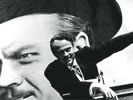Eye For Film >> Movies >> Citizen Kane (1941) Film Review
Citizen Kane
Reviewed by: James Benefield

A lot has been said about Citizen Kane. It’s a disarmingly prescient story of Orson Welles’ career (a man whose career peaks too early; Welles made this when he was in his twenties), an almost-biopic of media mogul William Randolph Hearst (even if Welles said that it isn’t, Hearst was said to be incredibly angry with the film) and a tale of the potent fall out from the American Dream (money does not necessarily buy happiness). Also, it might have been suggested a few times that it's one of the finest films ever made.
Ultimately, Citizen Kane is a testament, an apology and a critique of cold, hard ambition. Both the ambition of his central character and of Welles as a filmmaker are laid bare. It is a film that was highly innovative in its cinematography, soundtrack and special effects. It has a two-prong story of huge scope. It could almost be overreaching. It, however, is as essential as it is because of the successful execution of its risks. The story is also about ambition, showing the highs and the lows the central character’s, perhaps fatal, flaw can cause. It takes an ambitious man to make a film about a man with ambition.

After years of being forgotten, or at the very least being seen as a has-been, former entrepreneurial wunderkid Charles Foster Kane (Welles) dies alone in his palatial home Xanadu, with one word on his lips: Rosebud. The film is framed around this mystery. Reporter Jerry Thompson (William Alland) gets on the case of what this word meant, and comes into contact with numerous people including his butler, his best friend (who admits Kane behaved "like a swine"), his business manager and his surviving ex-wife (now an alcoholic). However, as time goes by, it becomes clear that it’s a quest with no easy answer.
The film’s second thread spins off these investigations, and comprises a series of flashbacks depicting and spanning Kane’s life. We get to see his triumphs (the success of the first newspaper he runs), intermingled with his personal failures (his two painful marriages), followed by his brief, but high-profile political career, and eventually his downfall and retreat from the spotlight. It becomes clear that Kane is not a nice piece of work; he’s a self-involved soul who, in his work and in his personal life, insists people will believe what he tells people to believe.
For such an important, far-ranging movie, this is a surprisingly tough and melancholy watch. It’s partly due to the concerns Welles has with loneliness. Welles asks how much anyone can ever know anyone. Despite two wives - one of whom he drives away because of his fatal flaw of ambition - numerous business associates and much media coverage, the answer is pretty pessimistic. That said, the film is very human, and its incredibly touching, and much-spoiled, ending offers much empathy and understanding into this seemingly stony man.
If you can stick proceedings, it’s clear why these two hours of celluloid have achieved such acclaim. Firstly, the movie looks great. The crisp cinematography accentuates the beautifully enigmatic shadows that dominate the look of the film, from the towering faux-gothic towers of Xanadu to the dark spaces in Kane’s first newspaper office. The story is wonderfully told, and it absorbs the viewer completely. Ultimately, the film is dominated by Welles’ imposing performance as the eponymous character, a figure who inspires equal parts dread and sympathy. It rings so true.
We stick with the story of Charles Foster Kane because we are in the hands of someone who understands the man’s ambition and impatience. He’s a monster, but he’s a monster we can understand. It also helps that Orson Welles has made an incredibly accomplished piece of cinema, which absorbs as much as it innovates. The question of whether it is the greatest film ever made rages on, and will never be definitively answered. One thing, however, is for sure: it’s terrific…
Reviewed on: 27 Oct 2009

















